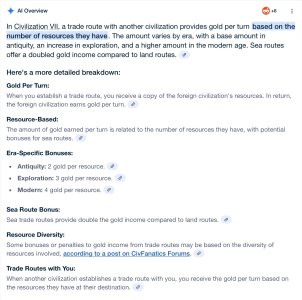gamemaster3000
Warlord
- Joined
- Dec 6, 2005
- Messages
- 189
Still impressed by how 80+ hours in to the game, I'm still making major revelations in to how subtle changes can have huge consequences.
The way that trade works in Civ 7 (you send a merchant, you get the resources in the city, they get gold per turn) seemed very simple. In a game with such a steep learning curve, it was one of the simpler changes.
Or so I thought.
But this change fixes a problem that has been happening since I was ten years old, endlessly staring at yellow square cities, covered-wagon settlers, and putting a fur skin rug in my throne room. The problem: The computer's garbage cities.
In every Civ from 1-6, if a tile had saltpeter on it, that meant that one civ and one civ only was getting saltpeter. If you wanted it, you either had to get a settler there first or take it from whoever did.
Not anymore.
Because trade now gives you a COPY of that resource. And what's better...they can't even stop you from taking it! Well sort of, if they block your trade route negotiations you'll only get the one trade route...but once they agree to increase that limit, for the rest of the age, you get a copy of another city's resource that they can't do a whole lot about.
This has huge implications, because now when the computer builds a garbage city on a 1, 2, or 3 tile island...GREAT! More resources for ME! All it takes is a trader and a little friendly diplomacy and I now most the benefits of that garbage city with none of the overhead.
It also opens up avenues to win the game without just conquering everyone, which is both realistic and can save a lot of time. And although resources aren't nearly as powerful as they were in some previous civs, getting a copy of an entire empire's resources definitely adds up!
And maybe it's a bit much to say that it "fixes" the problem, because the computer puts garbage cities in the way of other stuff than resources, but it is another example that if you're playing Civ 7 with a Civ 6 mentality, you're missing out!
The way that trade works in Civ 7 (you send a merchant, you get the resources in the city, they get gold per turn) seemed very simple. In a game with such a steep learning curve, it was one of the simpler changes.
Or so I thought.
But this change fixes a problem that has been happening since I was ten years old, endlessly staring at yellow square cities, covered-wagon settlers, and putting a fur skin rug in my throne room. The problem: The computer's garbage cities.
In every Civ from 1-6, if a tile had saltpeter on it, that meant that one civ and one civ only was getting saltpeter. If you wanted it, you either had to get a settler there first or take it from whoever did.
Not anymore.
Because trade now gives you a COPY of that resource. And what's better...they can't even stop you from taking it! Well sort of, if they block your trade route negotiations you'll only get the one trade route...but once they agree to increase that limit, for the rest of the age, you get a copy of another city's resource that they can't do a whole lot about.
This has huge implications, because now when the computer builds a garbage city on a 1, 2, or 3 tile island...GREAT! More resources for ME! All it takes is a trader and a little friendly diplomacy and I now most the benefits of that garbage city with none of the overhead.
It also opens up avenues to win the game without just conquering everyone, which is both realistic and can save a lot of time. And although resources aren't nearly as powerful as they were in some previous civs, getting a copy of an entire empire's resources definitely adds up!
And maybe it's a bit much to say that it "fixes" the problem, because the computer puts garbage cities in the way of other stuff than resources, but it is another example that if you're playing Civ 7 with a Civ 6 mentality, you're missing out!

